Sungai Sekonyer River

Jackamy
Paul & Derry Harper
Fri 12 Nov 2010 09:41
|
Friday 12th November
And so we began our journey up
the Sungai Sekonyer River into the heart of Borneo's rainforest. Borneo is the
world's third largest island and home to some of the most unique eco-systems and
creatures on the planet.
 Our crew - Mr Azis (driver), I
Ben (assistant), Joe (guide) and Topik (cook) - 4 fantastic men!
We motored gently between walls
of pandanus that fringed the river eager to spot our first orangutan but there
was so much other life on and alongside the river to keep us occupied until we
did. We were looking macaques scurrying through the forest canopy that it shares
with among 200 plus bird species as well as proboscis monkeys. Deeper into the
forest you can find sun bears, wild boars, clouded leopards, spotted cats,
pythons, gibbons, porcupines and sambar deer.
Kalimantan is one of the world's
last, vast wilderness areas offering the very last refuge to wild orangutans and
home to ancient civilisations including Dayak tribes that struggle to balance
modernity with their traditions. Below is a man, I wouldn't want to guess how
old he is (very old), gently paddling his canoe searching for something in the
palms which he will put in his hand woven basket. To the right is a fish farm.
The sad thing is that this river
that the locals and Dayak tribes are so dependent on is actually polluted with
mercury. There is a huge problem with illegal mining for gold a further
9-10 hours up the river but because they are so dependent on it, they still
fish, they are slowly poisoning themselves! And that is just one of the problems
facing the people and the animals in this special part of the world.
 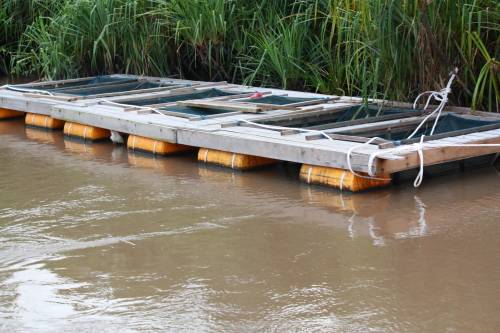   Another smaller
klotok............The petrol station
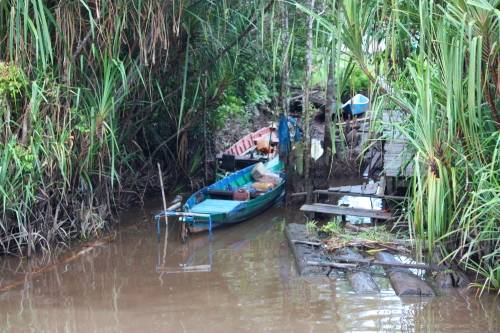
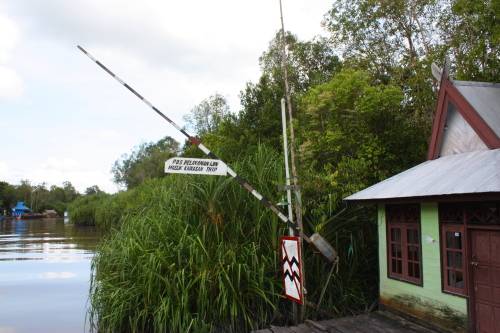 Canoes moored in an opening in
the palms, their villages behind the trees........................Entrance to
the National Park

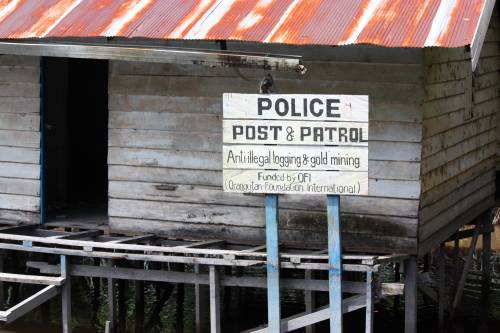 The police station
'Anti-illegal logging and gold mining'
We all know about the
threats of extinction of the orangutans but most of us shamefully turn a
blind eye when faced with monetary aid. Being up close and personal like this
really makes you think and feel a whole lot differently. It's difficult to
ignore as you're gliding ever deeper into the rainforest that is being destroyed
by the illegal loggers. Vast areas of rainforest are being destroyed every day,
the ironwood is valuable for boat building and furniture, the sales of which
subsidise the preproduction phase of palm oil plantations which are created
in their place, taking 5 years to produce a crop. As the prices for
palm oil soar the demand for plantations increases. While the palm oil is a versatile food product, it is a remarkably
lousy fuel. Studies show that more carbon is released from the conversion of
forests to palm plantations than saved through replacement of fossil fuel with
the palm oil produced. You might ask, 'why doesn't anyone stop them?', as did
we. The answer: corruption! They say that nothing can be done unless they
are caught red handed, but is there even anybody out there looking. The
government simply allow this to happen and they don't even try and stop the
boats loaded up with the logged trees. Palm oil exports have increased over 244
percent over the last 7 years, with toxic waste from the process poisoning not
just the rivers but workers too.
Half the planet's tropical
rainforests have already been cut down, burned and annihilated. The rest are
being obliterated at a rate of at least 28 hectares a minute. Ecological studies
have estimated that tropical deforestation drives 1700 species of plants and
animals to extinction each year as well as killing at least 2000 orangutans each
year.
 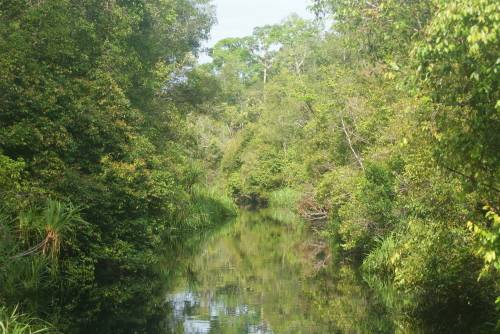 Gliding along peacefully
spotting the wildlife
 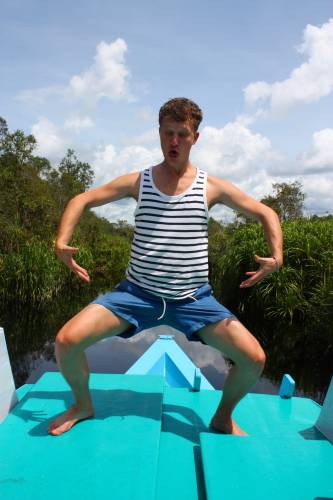 Our personal cheeky
monkey!
On a lighter note.............we
spotted our first orangutan around an hour up the river, sadly it disappeared
into the vegetation as we neared. This was a 'really really wild orangutan' as
Joe, the guide, put it. Even though it was only a glimpse, we felt that we had
arrived, our adventure had begun!
Not long after the first
sighting, the sharp-eyed Joe spotted another to our left, this one wasn't as
shy. She was 8-9 years old, around the age that they stay with their
mothers to. She just sat there clinging onto the branches munching and
observing us whilst we observed her. Incredible! In the wild orangutans live to
around 50 years old and in the rehabilitation centres to around 60. In the wild
they might have 3 babies but in the centres they can have 6-7.

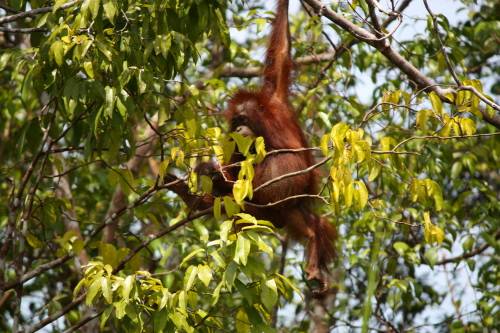 Meanwhile on the other side of
the river 30 + proboscis monkeys were jumping through the canopy. Found only in
Borneo, these odd creatures with their potbellies and oversized tubular noses
anxiously await klotoks. They have been known to plunge into the river from 10
metres high as the sound of the engine will scare the crocodiles away. No such
luck for us but watching them flying through the forest was spectacular enough.
They just kept on coming, leaping from one tree to another, even Joe was
excited!
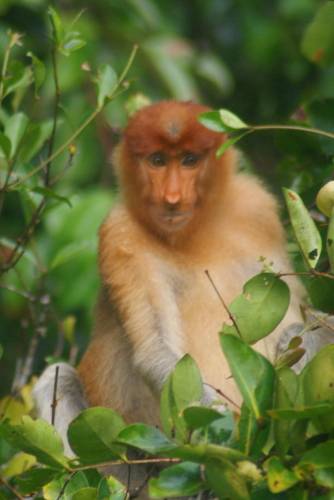
 Strange looking (he has a small
nose compared to others).................Ready to jump....1,2,3 (note the size
of his nose)
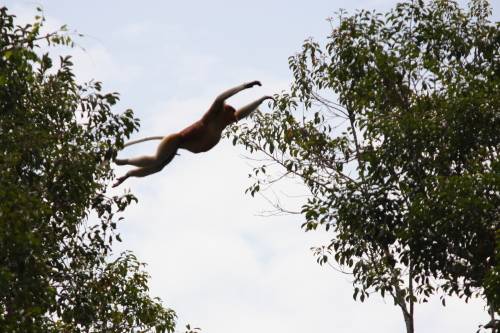
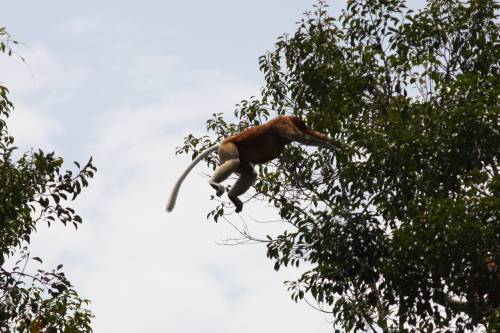 Go!!!!
 Hanging out in the tree
tops
As we continued further up the
river we spotted numerous different birds, more proboscis monkeys, long tailed
macaques and another adult orangutan who disappeared into the forest. The whole
journey up to Camp Leakey, the third station, was to take around 3 hours. Topik
timed lunch perfectly as we finished just as we arrived at the dock. The lunch
was a fantastic spread of food, including sticky rice, crayfish in a sweet and
sour sauce, chips, noodles and a plate of assorted vegetables. I wouldn't have
changed a thing, the food and setting was perfect!
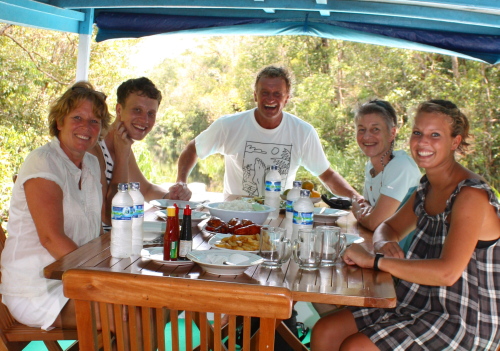 |